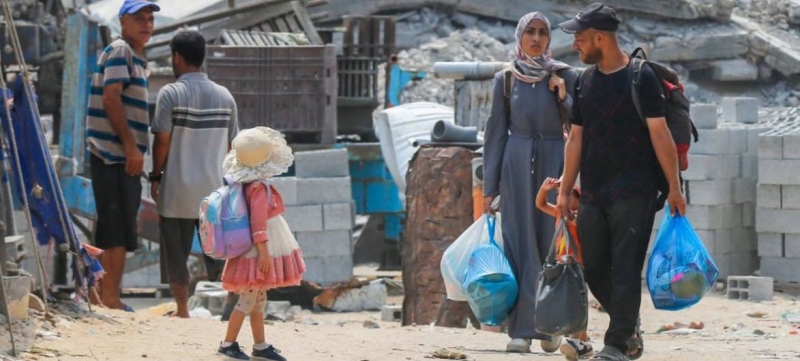
A family in devastated Gaza. Gaza: Fighting hampers polio vaccination efforts Peace and Security
The risk of polio spreading in Gaza remains high, requiring rapid and comprehensive measures, including humanitarian pauses in hostilities, UN humanitarian agencies said on Wednesday.
“At least two doses [of oral polio vaccine] are required to interrupt transmission,” explained experts from the World Health Organization (WHO) and the United Nations Children’s Fund (UNICEF).
Recall that on July 16, the Global Polio Laboratory Network (GPLN) detected vaccine-derived poliovirus type 2 in wastewater samples collected on June 23 in Khan Younis and Deir el-Balah.
Cases of paralysis
At the end of July, Gaza health authorities reported three cases of paralysis; the corresponding samples were sent to Jordan for testing. The WHO stressed that acute flaccid paralysis can have many causes, including poliovirus, and the results of the tests have not yet been published.
Gaza had high levels of polio immunization before the war, according to the WHO, but months of war have created an “ideal environment” for a weakened vaccine variant to mutate into a more powerful version of the virus that can paralyze those who are not fully vaccinated.
Read also:
Gaza war: clean water shortages and new evacuation orders
Gaps in immunization, coupled with poor water quality and lack of sanitation, are increasing the risk of vaccine-preventable diseases, including polio and others, experts have said. However, only 16 of Gaza’s 36 hospitals are “partially functional” and only 48 of the 107 primary health care facilities are open.
Humanitarian pauses
WHO and UNICEF are also concerned about delays in the delivery of polio vaccine and cold chain equipment due to ongoing fighting and insecurity in the enclave, and that regional tensions threaten to escalate.
WHO Director-General Tedros Adhanom Ghebreyesus has approved the donation of 1.23 million doses of the new oral polio vaccine type 2 to immunize more than 640,500 children under 10 years of age in Gaza.
To implement a mass vaccination campaign, humanitarian pauses in hostilities are needed to allow safe access throughout the enclave and protect health workers, UN agencies stressed.
